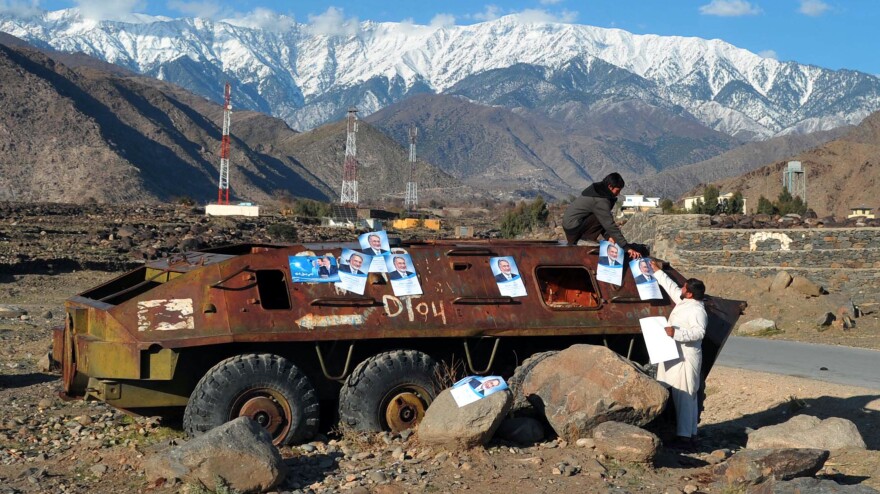The United States is winding down more than 12 years of military involvement in Afghanistan, and for most Americans, the country is rapidly fading into the background.
At the same time, Afghans are entering uncharted territory. President Hamid Karzai, who has led Afghanistan since shortly after the Taliban were ousted in 2001, is barred from running for a third term.
So Afghanistan is poised to do what it's never done before: change leaders through a democratic election.
Eleven candidates are trying to replace Karzai in the April 5 election. Ten are Pashtuns, the dominant ethnic group. Candidates are already holding rallies, debating and wooing tribal leaders.
But with no reliable polling, it's hard to gauge support for the candidates, and there's no clear front-runner at this point.
There are many unanswered questions. Will the elections be fair (past votes here have been marred by fraud)? Will Karzai throw his political machinery behind a preferred successor — and if so, whom? Will the Taliban disrupt the voting as they have pledged to?
We'll be writing much more about the election as it approaches. For now, here are sketches of the top-tier candidates according to political analysts.

Dr. Abdullah Abdullah, 53, an ophthalmologist who served as foreign minister in the Karzai government from 2001-2005. He split with Karzai and became the leading political opposition figure in the country. He was the main challenger to Karzai on the 2009 presidential ballot, getting 30 percent of the vote in the first round. He dropped out of the runoff election with Karzai, claiming the process was rigged against him.
Ashraf Ghani, 64, is one of the leading technocrats in Afghanistan. He has served as finance minister and as a World Bank official. He holds a doctorate from Columbia University and taught at several American universities. He is relatively well-known and popular in the West, but in the 2009 election he managed only 3 percent of the vote and finished fourth.
Qayum Karzai, 56, is the older brother of the current president. He lived in the U.S. for years and ran an Afghan restaurant in Baltimore. He served as a delegate to Afghanistan's constitution-making body in 2002, and later served as a member of the lower house of Parliament. He and other brothers of the president have been hounded by allegations of unethical business dealings.
Gen. Abdul Rahim Wardak, 68, is a former defense minister and adviser to President Karzai. He was a rebel commander during the war against the Soviet Union in the 1980s. He's held a number of other military positions over the years, and has been heavily involved with disarmament and reconciliation programs. He's well-regarded by Western military officials.
Dr. Zalmay Rassoul, 70, has served in several top posts, including foreign minister, national security adviser and minister of civil aviation. A polyglot, he studied in France, where he received his medical degree. He is unmarried and has no children, which is extremely unusual in Afghanistan. The soft-spoken politician is widely viewed as Karzai's choice as a successor, though Karzai says he will not endorse any candidate.
Abdul Rassoul Sayyaf, 64, is arguably the most controversial candidate in the race. He studied Islam at Cairo's Al-Azhar University and was one of the leading rebel commanders in the battle against the Soviets in 1980s. He had strong backing from Saudi Arabia and Pakistan in part because of his fundamentalist ideology. He was close to Osama bin Laden and is credited with inviting al-Qaida to Afghanistan in the 1990s. Human rights groups say he committed a variety of abuses during the war against the Soviets, and then in Afghanistan's civil war. Despite sharing some ideological views with the Taliban, he's a sworn enemy and a target for assassination by the militant group.
Copyright 2021 NPR. To see more, visit https://www.npr.org. 9(MDAyMjQ1NzYwMDEyMjU5MjA0MjE0Yzg1Mg004))









